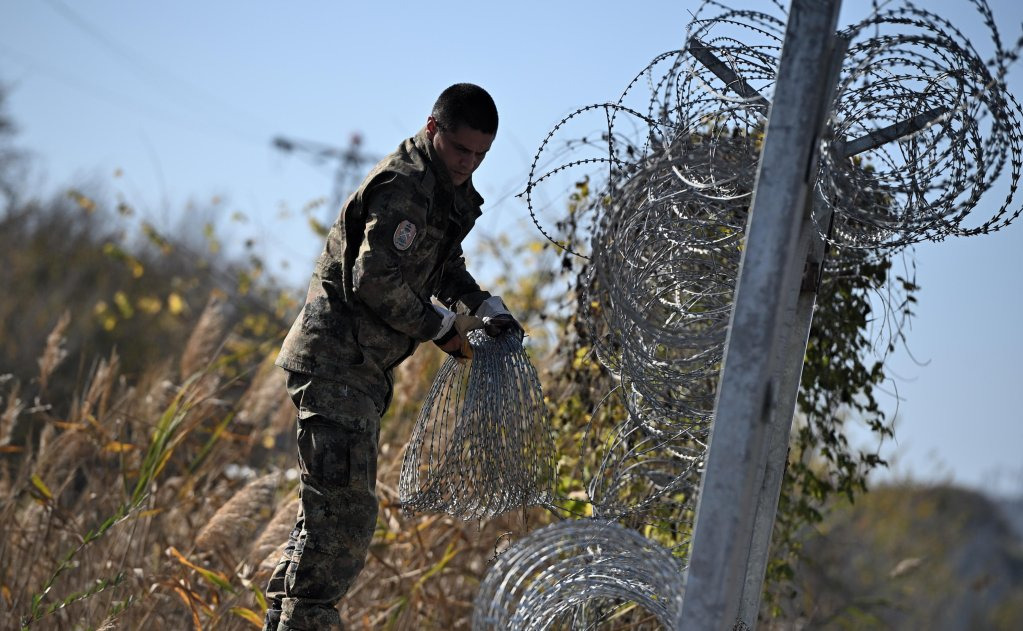The European Commission has announced two pilot projects with Romania and Bulgaria aimed at stopping irregular migration at the EU’s external borders.
“Strengthening the external borders with enhanced surveillance measures to be implemented at the Bulgaria-Turkey border is a key priority,” stated the EU Commission as it announced the ‘pilot project’ on Monday (March 20).
The project will use a multidisciplinary approach to strengthen border control, including deploying cameras, vehicle patrols and watchtowers to monitor the movement of migrants.
As well as increasing border protection it will mean “fast asylum procedures and more effective returns [of migrants],” said European Home Affairs Commissioner Ylva Johansson.
The cooperation announced with Bulgaria follows the launch last week of a pilot project with Romania (March 17), which will have similar controls along its border, with an extra focus on repatriation, border management and international cooperation.
The EU is working alongside two of its agencies, the border protection agency Frontex and the crime agency Europol in both pilot projects. The projects were announced following an EU summit in February.
Strengthening border controls
The EU Commission has said strengthening border controls and returns policy will be key for it to be able to continue to offer protection to those who are eligible. For all those who are not, it has promised that swifter returns and refusals will follow.
Last year, the number of migrants entering the European Union to claim asylum increased. Predictions have suggested that 2023 could continue the upward curve. More than 20,000 migrants have so far entered Italy by sea since the beginning of the year. In the same period last year, just 6,379 had entered and in the year before that, the number was 6,067.
Romania and Bulgaria signed a strategic partnership agreement on March 15 which is designed to strengthen their cooperation still further. Both countries are hoping to accede to the EU’s Schengen zone, which would allow them free movement within the Schengen bloc.
Strategic partnership
The English language portal Romania Insider reports that as part of increased economic and sectoral cooperation, Romania and Bulgaria are working together on transport infrastructure projects on the river Danube and the Black Sea.
In their bid to join the Schengen area, both countries are keen to demonstrate their “readiness to be part of the solutions to manage this challenge [illegal migration],” said Romanian President Klaus Iohannis when the two countries signed the deal.
At the beginning of February, Bulgarian President Rumen Radev asked the European Commission for significant funding to help strengthen and extend the fence along its border with Turkey. At the time, the European news portal Euractiv reported that the fence was 130 kilometers long, but that Radev said he wanted to build a more solid fence “to reduce to a minimum the possibility of illegal entry into the territory of the EU.”
The Austrian government, reported Euractiv, was lobbying for €2 billion in emergency funds from the EU to help secure the fence along the border with Turkey. Bulgaria has also received substantial amounts of surveillance equipment to help it patrol the border. The EU said it would not finance the wall.
‘More effective migration management’
President Radev told Euractiv in February: “When we have even better equipment for surveillance and security, which will register penetration inside the territory of the EU, the main question remains: after these people cross the border and this illegal crossing is officially established, what do we do with [them]?”
Organizations like Human Rights Watch have highlighted the fact that until now, many of the countries on Europe’s external borders appear to have been resorting to illegal deportations rather than registering migrants and allowing them to apply for asylum.
In February, migrants told the news agency Agence France Presse that they had been “stripped” and beaten by agents in Bulgaria and subjected to brutal treatment. The Bulgarian authorities deny the allegations.
Bulgaria’s Deputy Prime Minister Ivan Demerdzhiev, who is also the interior minister, said he saw the pilot project as “an opportunity to join efforts and respond in a coordinated manner to current migratory challenges.”
Demerdzhiev said in a European Commission press statement to mark the launch of the project that it brought a “set of targeted tools for accelerated asylum and return procedures, which … once implemented, will contribute to enhance the security in the European Union and its Member States.”
He concluded that the project would provide “tangible results…and will translate into more effective migration management at an EU level.”
Source : InfoMigrants


